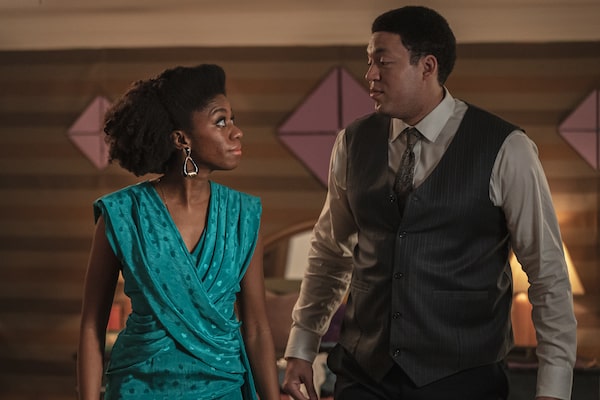
Anesha L. Bailey and Shayn Walker in director Rachel Rose's Tryst.Sydney Wong
After successfully organizing Vancouver’s Crazy8s Film Festival, a showcase for an intensive eight-day filmmaking event, for 21 years in a row, co-executive directors Erin Mussolum and Paul Armstrong realized that they had three options for 2021.
The first was the best-case scenario, where members of the B.C.-based film industry would gather to watch short films on a giant screen. The second option would see the festival cancelled, depriving aspiring filmmakers of a crucial opportunity to further their careers. Thankfully, Mussolum and Armstrong pursued a third option, and both Canadian filmmakers and audiences are better off because of it.
Founded in 1999, Crazy8s is an eight-day filmmaking challenge designed to provide funding and foster support for aspiring filmmakers. Every year around 200 teams apply, and after a selection process, a final six receive $1,000 and production support from the local film industry in Vancouver. These six teams then shoot a 15-minute short film in three days, followed by post-production for five days.
Notable alumni include Dylan Akio Smith, whose Crazy8s film, Man Feel Pain, won Best Short Film at Toronto International Film Festival, paving the way for his feature film debut, The Cabin Movie. Others such as Zach Lipovsky and Shannon Kohli have had prolific careers in directing feature films and television shows.
The frenetic pace of the challenge is perhaps best summarized by the festival’s tagline: “It’s fast! It’s fun! It’s Crazy8s!”
Unfortunately, the pandemic challenged every part of that tagline. Mussolum and Armstrong began preparing for the 2021 festival last year without knowing how any of the variables involved would change. So they made three different plans in terms of production budgets (how much funding they’d receive), production windows (how much time they’d have to shoot) and production plans (what and how they’d shoot it).
“We then just agreed as business partners,” says Mussolum, “that we’d [keep going] until somebody said we couldn’t.”
One hundred and fifty pitches were submitted to Crazy8s for this year’s festival, compared to the 200 they received last year.
“We thought it would be down much more because of the pandemic. So we were quite surprised to get that many pitches,” says Armstrong.
The second surprise was less pleasant. Crazy8s receives much of its sponsorship from organizations in the B.C. film industry, and a tough financial year for them meant overall funding for the festival dropped by 15 per cent.
“It was a little bit scary at first,” admits Mussolum, “because we thought, ‘What if we continue to see a drop?’”
But they had more immediate challenges to tackle: How to produce six short films in the middle of a pandemic.

Carmen Moore and Hiro Kanagawa in iDorothy, directed by Luvia Petersen.Jessie Robertson
They minimized the number of people allowed on set, provided crew members with PPE equipment and conducted temperature checks. Each film crew also had a “COVID safety captain.”
“We basically put the fear of God into every filmmaker,” says Mussolum, referring to the extensive workshops conducted regarding safety protocols.
The changes extended to words on paper as well. The six filmmakers were encouraged not to have crowd scenes in their scripts.
All of this led to two remarkable outcomes, the first of which happened behind the camera.
“We’re really pleased to share that we had zero cases on any of the productions that we did,” says Mussolum.
The second is that none of the six short films look like they’ve been constrained by or conceived during a pandemic. They range in genre from family drama to science fiction to a smooth blend of horror and comedy. They feature diverse faces and don’t shy away from using subtitles. Although created under exceptional circumstances, they will be seamlessly integrated into Crazy8s’ catalogue of 127 films.
Crazy8s premiered the short films online May 1 and the event was attended virtually by members of the film industry as well as general audiences. The six filmmaking teams will now showcase their work in festivals around the world, utilizing it as a building block to further their careers. Though there is currently no plan to release these films to the public, the filmmakers involved are looking forward to future projects in the British Columbia film industry.
“We have an amazing film industry that’s been up and going,” says Mussolum, “and we’re just mirroring them. We make short films, but we’re a pivotal part of the industry.”
If lockdown restrictions are lifted this year, the 2021 Crazy8s film challenge will perhaps be remembered as the craziest one so far. Future filmmakers looking to learn from this year’s lessons would be well served by watching the behind-the-scenes feature that was shown at the start of the premiere.
A disembodied female voice, acting as the personification of the dreaded empty white page that every writer faces, asks Canadian actor and filmmaker Luvia Petersen an important question.
“Where do you get inspiration? Because let’s admit it, the world is falling apart!”
To which the director of iDorothy, one of the festival’s six shorts, replies with a chuckle, “Even that can be pretty inspiring.”